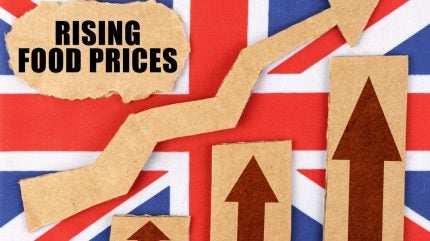
Britain’s grocery shoppers face mounting pressure as food inflation climbs, pushing up the overall cost of the family shop.
New data from the British Retail Consortium (BRC) reveals a persistent rise in the price of essentials, eroding household budgets and consumer confidence.

Discover B2B Marketing That Performs
Combine business intelligence and editorial excellence to reach engaged professionals across 36 leading media platforms.
Food inflation drives rising shop prices
Shop price inflation returned to positive territory in June for the first time in nearly a year, rising 0.4% compared to a 0.1% fall in May, according to BRC‑NielsenIQ figures.
Food inflation surged by 3.7% year‑on‑year in June, up from 2.8% in May. Fresh produce inflation reached 3.2%, while ambient food costs rose 4.3%.
These trends pushed shop price inflation higher again in July, where overall prices rose 0.7%, with food up 4.0% annually—the highest rate since early 2024.
Helen Dickinson highlights budget and labour pressures
Helen Dickinson, chief executive of the BRC, emphasised that the return of headline inflation came within three months of last autumn’s Budget measures taking effect.

US Tariffs are shifting - will you react or anticipate?
Don’t let policy changes catch you off guard. Stay proactive with real-time data and expert analysis.
By GlobalDataShe noted food prices showed little sign of easing, particularly in fresh produce, where meat prices have been pushed up by elevated wholesale costs and rising labour expenses.
Vegetable and fruit prices were also affected by hot, dry weather reducing harvest yields.
Dickinson warned that retailers had long cautioned about rising costs following increases to employer national insurance contributions and the national living wage—factors forecast to drive further food inflation before the year’s end.
Mike Watkins on consumer willingness to spend
Mike Watkins, head of retailer and business insight at NielsenIQ, said that broader economic conditions and supply chain disruptions were behind the price increases.
He added that while Britain’s spell of good weather had boosted demand, rising prices could prove problematic if consumers become reluctant to spend later in the year.
He suggested retailers may reinforce value‑for‑money messaging over the summer as a result.
Retail downturn and consumer behaviour
Retail sales have declined for ten consecutive months, with the Confederation of British Industry (CBI) reporting sales sentiment at –34 in July, improving slightly from –46 in June—but still signalling weak consumer demand.
Economic uncertainty, rising labour costs and increased employer contributions are cited as key factors curtailing household spending.
Compounding the pressure, survey data from Worldpanel shows grocery inflation reached 5.2% in July—the highest since early 2024—leading households to resort to simpler meals and shift towards supermarket own‑label lines to manage budgets.
Analysts estimate this could raise the average annual grocery bill by nearly £275, now totalling around £5,283.
Policy change and calls for government action
Retailers face a roughly £7 billion rise in operating costs this year from wage increases, social insurance reforms and packaging levies, according to BRC analysis.
They warn that without mitigation, such government measures risk forcing further price rises and depressing consumer spending.
Dickinson urged ministers to ensure upcoming business rates reforms do not inadvertently increase charges for shops, stressing the need for targeted relief to curb inflationary pressures and support high street sustainability.
Economic implications and future outlook
Higher food prices remain the key driver of inflation in shops, while non‑food goods continue to record mild deflation, especially in gardening and DIY categories where discounts are widespread.
Shop price inflation accelerated again in July, reinforcing concerns over further household strain.
Experts expect inflation to stay above 3% through the rest of 2025, near the Bank of England’s projected peak of 3.7%, which is likely to delay any meaningful interest‑rate cuts and keep pressure on spending capacity.
As consumers face steep rises in the cost of a typical weekly shop, the outlook remains challenging for both retailers and households. Without policy changes or unexpected relief in wholesale prices, many British families are likely to feel the full weight of food inflation in the months ahead.





